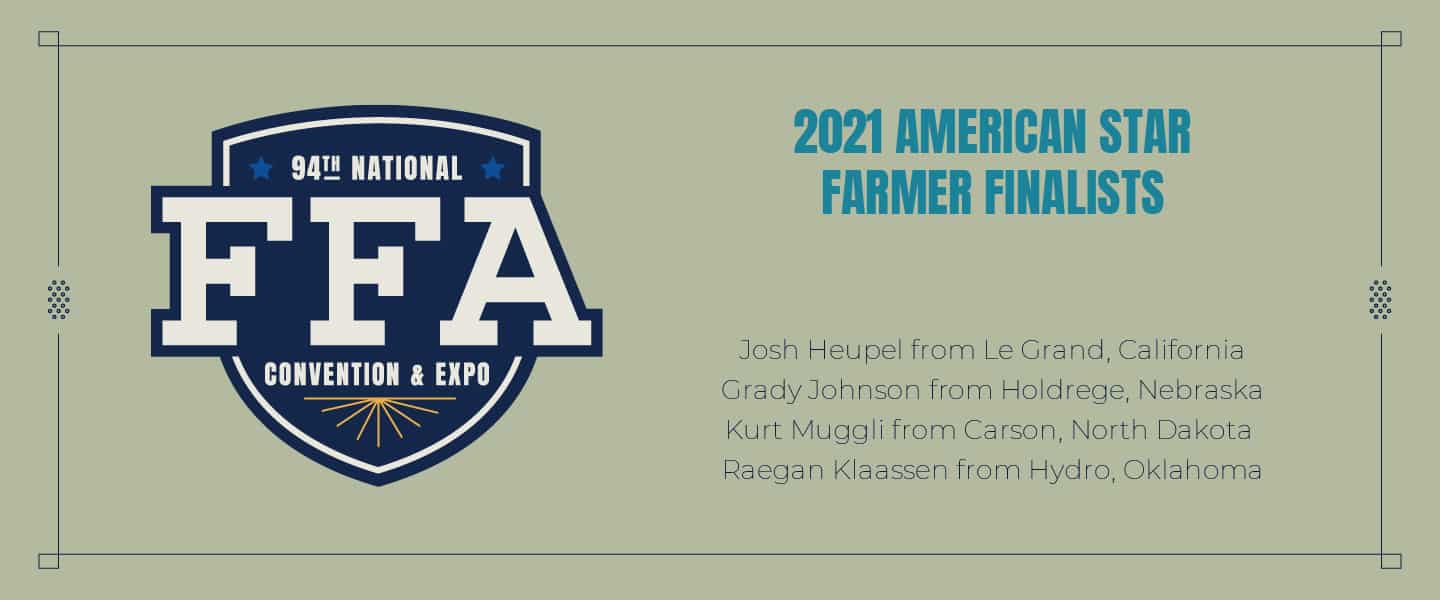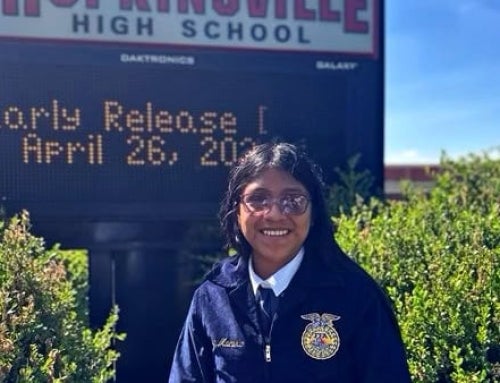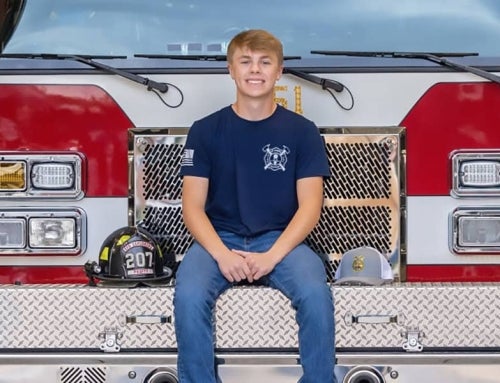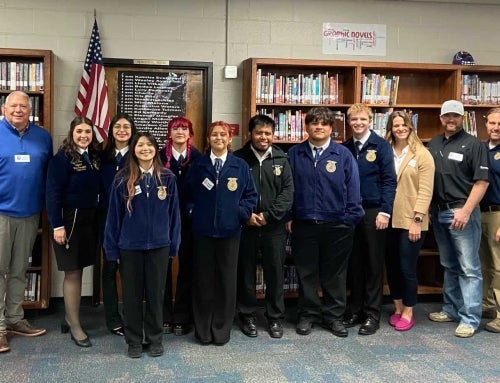Each year at the National FFA Convention & Expo, four FFA members are honored with American Star Awards for outstanding accomplishments in FFA and agricultural education.
The American Star Awards, including American Star Farmer, American Star in Agribusiness, American Star in Agricultural Placement and American Star in Agriscience, are presented to FFA members who demonstrate outstanding agricultural skills and competencies through completion of supervised agricultural experience (SAE). A required activity in FFA, an SAE allows students to learn by doing, by owning or operating an agricultural business, working or serving an internship at an agriculture-based business, or conducting an agriculture-based scientific experiment and reporting results.
Other requirements to achieve the award include demonstrating top management skills; completing key agricultural education, scholastic and leadership requirements; and earning an American FFA Degree, the organization’s highest level of student accomplishment.
The American Star Farmer is awarded to the FFA member that demonstrates the top production agriculture SAE in the nation. Here are the 2021 finalists for American Star Farmer:
Josh Heupel, California
Managing one project wasn’t enough for Josh Heupel’s SAE. Neither was two nor three.
So, how busy is he?
“My [SAE] consists of four main projects,” Heupel, a member of Merced-Golden Valley FFA, said. “They are walnut production, almond production, agricultural mechanics and a spreading business that I call J. Heupel’s Spreading.”
Heupel raises walnuts and almonds on nearly 200 acres of land. Working on an orchard is pretty typical for a California farmer, but what makes his SAE truly unique is his success as an inventor.
“Since my freshman year of high school, I’ve been designing and manufacturing different mechanics projects and farm implements for our family farm and for myself,” he said. “I’ve been able to design, manufacture, patent and create new implements that are helping to change the farming industry, especially here in California.”
The invention Heupel is working on now is what he calls an orchard soil conditioner. California is prone to droughts, and when the ground gets dry, it cracks. Nuts, fruit and other small crops can fall into these cracks and rob farmers of their full profits. Therefore, Heupel made a machine for tilling soil in orchards so farmers could plant between the trees and keep the ground healthy.
“Ultimately, what we’re doing here is we are trying to create a new sustainable process called cover cropping,” he said. “Not only is this a sustainable practice, but it’s helping us out in harvest in the end.”
Heupel’s spreading business is based on his inventions too. In high school, he built his own spreader that can easily disperse fertilizers and other additives over a crop field — it even works with sand.
Farming is a family business for many, and Heupel was inspired to be active in FFA because his father, uncle and grandfather were all FFA members. He added that his ag teachers at Golden Valley High School were exceptional leaders too.
“We were ranked the number one ag program in California recently,” he said.
As Heupel continues farming and partnering with manufacturers to sell his inventions to the masses, his advice for FFA members starting an SAE is to be patient.
“There’s … countless nights that I spent in the shop trying to make something work that just wasn’t going to get done that night,” he said. “You really just have to have the patience and time to try and live out your dreams.”
Grady Johnson, Nebraska
Agriculture is an industry with many technological advancements behind the scenes, and Grady Johnson wants to use the latest and greatest tech to help his farming operation succeed.
“For me, it’s just seeing what’s next,” Johnson, a member of the Holdrege FFA, said. “There’s been a lot of innovations in agriculture, and it’s fun to be on the forefront of those and see how we can do more with less.”
Nebraska is famous for its corn, and Johnson’s SAE is primarily about baling corn stalks. While he sells a lot of his bales to feed yards so Nebraska’s livestock have something to eat, he said the production of ethanol — a corn-based innovation in the fuel industry — is also a crucial part of his forward-thinking business strategy.
Corn and ethanol weren’t always what Johnson was focused on, though. He got his start as an independent farmer by raising sheep.
“It started when I was between my freshman and sophomore year of high school,” he said. “I got into sheep production. I always worked for the family operation, but I wanted to start my own business. … And then that [sheep] went to the wayside as the years went on.”
As a business owner, he learned some of the most valuable information related to finances and management in his ag classes. The Agricultural Experience Tracker, or AET, was a particularly helpful bit of technology during his formative years.
“AET was really my first experience with some sort of financial or record-keeping system,” he said. “And it showed you the importance of that, and it helped your operation grow.”
Johnson’s best advice for FFA members who want to start their SAEs is to keep an open mind and embrace new techniques, innovations and ideas.
“I felt like FFA was the way to let you step out of the comfort zone and try something new,” he said. “You can make anything possible. Start early and figure out what you like.”
Raegan Klaasen, Oklahoma
Most farmers get their start in agriculture because their family was already in the business, and Raegan Klaassen is no exception. However, her father, Chris, is more than just a farmer — he’s also her ag teacher.
“That, by far, was the most helpful thing ever,” she said. “Not only was he helping me in the classroom, but he was also here at home with me, and I was able to get that one-on-one time with him.”
A member of the Hydro-Eakly FFA in Oklahoma, Klaasen’s SAE involves raising a diverse selection of cattle and crops. Her land and equipment are rented from her parents with a family discount, but she said the most helpful thing they’ve done for her has been to encourage her.
“My parents and I made it a big goal to become an Oklahoma Star Farmer and potentially an American Star finalist like I’ve done,” she said. “My parents really talked me into starting my SAE at a very young age and always encouraged me to have a very strong SAE that was very diverse.”
The diversity of her SAE is something that keeps her busy. She currently owns around 30 cows with dozens of calves, and she continually rotates a variety of crops — peanuts, wheat, black-eyed peas and more — on over 300 acres of land. Klaasen plans to double the number of cows by the end of 2022.
“I showed cattle from when I was 4 years old to a senior in high school,” she said. “I would go and show everywhere in Oklahoma. I would show out-of-state too, and I was pretty successful with that.”
Her farming operation has been profitable so far — enough to pay for college — but she said the COVID-19 pandemic and its effects on the market have significantly been affecting her, both financially and personally.
“Everything was online, and it made it extremely hard to connect,” she said.
For FFA members starting their SAEs, Klaasen’s advice is to reach out to mentors and always work hard.
“Ninety-nine percent of the time, hard work is rewarded,” she said. “I never expected a small-town girl like myself that had 20 people in her graduating high school class to accomplish as much as I have.”
Kurt Muggli, North Dakota
Agriculture is an industry built on a lot of hard work, but Kurt Muggli doesn’t think that’s a problem at all — he enjoys a good challenge.
“I would say I’ve always enjoyed being a part of agriculture,” Muggli, a member of Grant County FFA in North Dakota, said. “It’s a challenge, and it’s a fun experience to farm.”
Muggli is a young farmer specializing in diversified crop production for his SAE. Like so many farmers before him, he got his start by inheriting land from his family.
“My parents farm and I had an opportunity to rent some ground,” he said. “I started with 200 acres, raising wheat, corn, soybeans and sunflowers.”
Although his farm started small in high school, Muggli currently manages crops on more than 1,700 acres — an 850% increase in around five years. He spends most of his days doing maintenance work on his farm equipment, and sometimes he feels like he repairs things more than he uses them.
“We drive trucks, combines, sprayers; I mean everything,” Muggli said.
His ag classes and FFA advisors provided helpful insights into the world of ag while he was still in school, and it helped him feel prepared for his current job. “We learned about a lot of different things and got to see what other operations do compared to [us], and how different people run their operations,” he said. “So, learn how you can improve.”
The best advice Muggli has to offer FFA members who want to start their SAEs is simple but essential: keep good records.
“You can’t keep too many records,” he said. “You can look back and see what you did and where, and it’s a lot easier to write your SAEs when you get done with it too. It even helps on the farming side.”
The American Star Awards are sponsored by Case IH, Elanco Animal Health and Syngenta. For more information on the awards, visit FFA.org.
General convention sessions will air live on RFD-TV and The Cowboy Channel. FFA members and supporters can tune in and watch gavel-to-gavel coverage of the event. To learn more, visit Convention.FFA.org.












